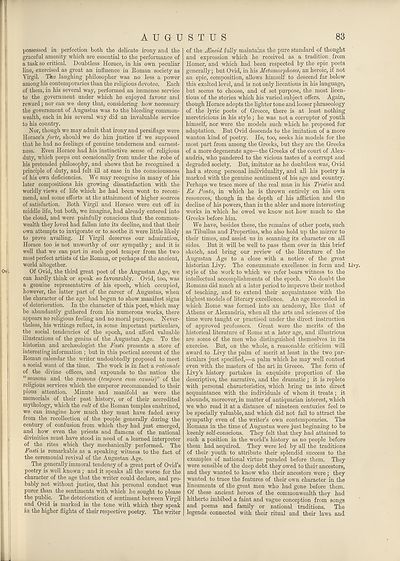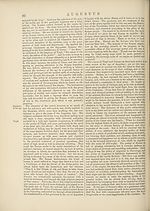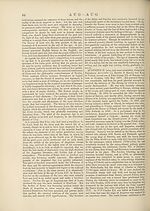Encyclopaedia Britannica > Volume 3, Athens-BOI
(95) Page 83
Download files
Complete book:
Individual page:
Thumbnail gallery: Grid view | List view

AUGUSTUS 83
possessed in perfection both the delicate irony and the
graceful amenity which are essential to the performance of
a task so critical. Doubtless Horace, in his own peculiar
line, exercised as great an influence in Roman society as
Virgil. The laughing philosopher was no less a power
among his contemporaries than the religious devotee. Each
of them, in his several way, performed an immense service
to the government under which he enjoyed favour and
reward; nor can we deny that, considering how necessary
the government of Augustus was to the bleeding common¬
wealth, each in his several way did an invaluable service
to his country.
Nor, though we may admit that irony and persiflage were
Horace’s forte, should we do him justice if we supposed
that he had no feelings of genuine tenderness and earnest¬
ness. Even Horace had his instinctive sense of religious
duty, which peeps out occasionally from under the robe of
his pretended philosophy, and shows that he recognised a
principle of duty, and felt ill at ease in the consciousness
of his own deficiencies. We may recognise in many of his
later compositions his growing dissatisfaction with the
worldly views of life which he had been wont to recom¬
mend, and some efforts at the attainment of higher sources
of satisfaction. Both Virgil and Horace were cut off in
middle life, but both, we imagine, had already entered into
the cloud, and were painfully conscious that the common¬
wealth they loved had fallen into its decline, and that their
own attempts to invigorate or to soothe it were little likely
to prove availing. If Virgil deserves our admiration,
Horace too is not unworthy of our sympathy; and it is
well that we can part in such good temper from the two
most perfect artists of the Roman, or perhaps of the ancient,
world altogether.
Of Ovid, the third great poet of the Augustan Age, we
can hardly think or speak so favourably. Ovid, too, was
a genuine representative of his epoch, which occupied,
however, the latter part of the career of Augustus, when
the character of the age had begun to show manifest signs
of deterioration. In the character of this poet, which may
be abundantly gathered from his numerous works, there
appears no religious feeling and no moral purpose. Never¬
theless, his writings reflect, in some important particulars,
the social tendencies of the epoch, and afford valuable
illustrations of the genius of the Augustan Age. To the
historian and archaeologist the Fasti presents a store of
interesting information ; but in this poetical account of the
Roman calendar the writer undoubtedly proposed to meet
a social want of the time. The work is in fact a rationale
of the divine offices, and expounds to the nation the
“ seasons and the reasons (tempora cum causis)” of the
religious services which the emperor recommended to their
pious attention. Minute and manifold as were the
memorials of their past history, or of their accredited
mythology, which the cult of the Roman temples enshrined,
we can imagine how much they must have faded away
from the recollection of the people generally during the
century of confusion from which they had just emerged,
and how even the priests and flamens of the national
divinities must have stood in need of a learned interpreter
of the rites which they mechanically performed. The
Fasti is remarkable as a speaking witness to the fact of
the ceremonial revival of the Augustan Age.
The generally immoral tendency of a great part of Ovid’s
poetry is well known; and it speaks all the worse for the
character of the age that the writer could declare, and pro¬
bably not without justice, that his personal conduct was
purer than the sentiments with which he sought to please
the public. The deterioration of sentiment between Virgil
and Ovid is marked in the tone with which they speak
in the higher flights of their respective poetry. The writer
of the jEneid fully maintains the pure standard of thought
and expression which he received as a tradition. from
Homer, and which had been respected by the epic poets
generally; but Ovid, in his Metamorphoses, an heroic, if not
an epic, composition, allows himself to descend far below
this exalted level, and is not only licentious in his language,
but seems to choose, and of set purpose, the most licen¬
tious of the stories which his varied subject offers. Again,
though Horace adopts the lighter tone and looser phraseology
of the lyric poets of Greece, there is at least nothing
meretricious in his style; he was not a corrupter of youth
himself, nor were the models such which he proposed for
adaptation. But Ovid descends to the imitation of a more
wanton kind of poetry. He, too, seeks his models for the
most part from among the Greeks, but they are the Greeks
of a more degenerate age—the Greeks of the court of Alex¬
andria, who pandered to the vicious tastes of a corrupt and
degraded society. But, imitator as he doubtless was, Ovid
had a strong personal individuality, and all his poetry is
marked with the genuine sentiment of his age and country.
Perhaps we trace more of the real man in his Tristia and
Ex Ponto, in which he is thrown entirely on his own
resources, though in the depth of his affliction and the
decline of his powers, than in the abler and more interesting
works in which he owed we know not how much to the
Greeks before him.
We have, besides these, the remains of other poets, such
as Tibullus and Propertius, who also hold up the mirror to
their times, and assist us in scanning its character on all
sides. But it will be well to pass them over in this brief
sketch, and bring our review of the literature of the
Augustan Age to a close with a notice of the great
historian Livy. The consummate excellence in form and Livy,
style of the work to which we refer bears witness to the
intellectual accomplishments of the epoch. No doubt the
Romans did much at a later period to improve their method
of teaching, and to extend their acquaintance with the
highest models of literary excellence. An age succeeded in
which Rome was formed into an academy, like that of
Athens or Alexandria, when all the arts and sciences of the
time were taught or practised under the direct instruction
of approved professors. Great were the merits of the
historical literature of Rome at a later age, and illustrious
are some of the men who distinguished themselves in its
exercise. But, on the whole, a reasonable criticism will
award to Livy the palm of merit at least in the two par¬
ticulars just specified,—a palm which he may well contest
even with the masters of the art in Greece. The form of
Livy’s history partakes in exquisite proportion of the
descriptive, the narrative, and the dramatic; it is replete
with personal characteristics, which bring us into direct
acquaintance with the individuals of whom it treats ; it
abounds, moreover, in matter of antiquarian interest, which
we who read it at a distance of nineteen centuries feel to
be specially yaluable, and which did not fail to attract the
sympathy even of the writer’s own contemporaries. The
Romans in the time of Augustus were just beginning to be
keenly self-conscious. They felt that they had attained to
such a position in the world’s history as no people before
them had acquired. They were led by all the traditions
of their youth to attribute their splendid success to the
examples of national virtue paraded before them. They
were sensible of the deep debt they owed to their ancestors,
and they wanted to know who their ancestors were ; they
wanted to trace the features of their own character in the
lineaments of the great men who had gone before them.
Of these ancient heroes of the commonwealth they had
hitherto imbibed a faint and vague conception from songs
and poems and family or national traditions. The
legends connected with their ritual and their laws and
possessed in perfection both the delicate irony and the
graceful amenity which are essential to the performance of
a task so critical. Doubtless Horace, in his own peculiar
line, exercised as great an influence in Roman society as
Virgil. The laughing philosopher was no less a power
among his contemporaries than the religious devotee. Each
of them, in his several way, performed an immense service
to the government under which he enjoyed favour and
reward; nor can we deny that, considering how necessary
the government of Augustus was to the bleeding common¬
wealth, each in his several way did an invaluable service
to his country.
Nor, though we may admit that irony and persiflage were
Horace’s forte, should we do him justice if we supposed
that he had no feelings of genuine tenderness and earnest¬
ness. Even Horace had his instinctive sense of religious
duty, which peeps out occasionally from under the robe of
his pretended philosophy, and shows that he recognised a
principle of duty, and felt ill at ease in the consciousness
of his own deficiencies. We may recognise in many of his
later compositions his growing dissatisfaction with the
worldly views of life which he had been wont to recom¬
mend, and some efforts at the attainment of higher sources
of satisfaction. Both Virgil and Horace were cut off in
middle life, but both, we imagine, had already entered into
the cloud, and were painfully conscious that the common¬
wealth they loved had fallen into its decline, and that their
own attempts to invigorate or to soothe it were little likely
to prove availing. If Virgil deserves our admiration,
Horace too is not unworthy of our sympathy; and it is
well that we can part in such good temper from the two
most perfect artists of the Roman, or perhaps of the ancient,
world altogether.
Of Ovid, the third great poet of the Augustan Age, we
can hardly think or speak so favourably. Ovid, too, was
a genuine representative of his epoch, which occupied,
however, the latter part of the career of Augustus, when
the character of the age had begun to show manifest signs
of deterioration. In the character of this poet, which may
be abundantly gathered from his numerous works, there
appears no religious feeling and no moral purpose. Never¬
theless, his writings reflect, in some important particulars,
the social tendencies of the epoch, and afford valuable
illustrations of the genius of the Augustan Age. To the
historian and archaeologist the Fasti presents a store of
interesting information ; but in this poetical account of the
Roman calendar the writer undoubtedly proposed to meet
a social want of the time. The work is in fact a rationale
of the divine offices, and expounds to the nation the
“ seasons and the reasons (tempora cum causis)” of the
religious services which the emperor recommended to their
pious attention. Minute and manifold as were the
memorials of their past history, or of their accredited
mythology, which the cult of the Roman temples enshrined,
we can imagine how much they must have faded away
from the recollection of the people generally during the
century of confusion from which they had just emerged,
and how even the priests and flamens of the national
divinities must have stood in need of a learned interpreter
of the rites which they mechanically performed. The
Fasti is remarkable as a speaking witness to the fact of
the ceremonial revival of the Augustan Age.
The generally immoral tendency of a great part of Ovid’s
poetry is well known; and it speaks all the worse for the
character of the age that the writer could declare, and pro¬
bably not without justice, that his personal conduct was
purer than the sentiments with which he sought to please
the public. The deterioration of sentiment between Virgil
and Ovid is marked in the tone with which they speak
in the higher flights of their respective poetry. The writer
of the jEneid fully maintains the pure standard of thought
and expression which he received as a tradition. from
Homer, and which had been respected by the epic poets
generally; but Ovid, in his Metamorphoses, an heroic, if not
an epic, composition, allows himself to descend far below
this exalted level, and is not only licentious in his language,
but seems to choose, and of set purpose, the most licen¬
tious of the stories which his varied subject offers. Again,
though Horace adopts the lighter tone and looser phraseology
of the lyric poets of Greece, there is at least nothing
meretricious in his style; he was not a corrupter of youth
himself, nor were the models such which he proposed for
adaptation. But Ovid descends to the imitation of a more
wanton kind of poetry. He, too, seeks his models for the
most part from among the Greeks, but they are the Greeks
of a more degenerate age—the Greeks of the court of Alex¬
andria, who pandered to the vicious tastes of a corrupt and
degraded society. But, imitator as he doubtless was, Ovid
had a strong personal individuality, and all his poetry is
marked with the genuine sentiment of his age and country.
Perhaps we trace more of the real man in his Tristia and
Ex Ponto, in which he is thrown entirely on his own
resources, though in the depth of his affliction and the
decline of his powers, than in the abler and more interesting
works in which he owed we know not how much to the
Greeks before him.
We have, besides these, the remains of other poets, such
as Tibullus and Propertius, who also hold up the mirror to
their times, and assist us in scanning its character on all
sides. But it will be well to pass them over in this brief
sketch, and bring our review of the literature of the
Augustan Age to a close with a notice of the great
historian Livy. The consummate excellence in form and Livy,
style of the work to which we refer bears witness to the
intellectual accomplishments of the epoch. No doubt the
Romans did much at a later period to improve their method
of teaching, and to extend their acquaintance with the
highest models of literary excellence. An age succeeded in
which Rome was formed into an academy, like that of
Athens or Alexandria, when all the arts and sciences of the
time were taught or practised under the direct instruction
of approved professors. Great were the merits of the
historical literature of Rome at a later age, and illustrious
are some of the men who distinguished themselves in its
exercise. But, on the whole, a reasonable criticism will
award to Livy the palm of merit at least in the two par¬
ticulars just specified,—a palm which he may well contest
even with the masters of the art in Greece. The form of
Livy’s history partakes in exquisite proportion of the
descriptive, the narrative, and the dramatic; it is replete
with personal characteristics, which bring us into direct
acquaintance with the individuals of whom it treats ; it
abounds, moreover, in matter of antiquarian interest, which
we who read it at a distance of nineteen centuries feel to
be specially yaluable, and which did not fail to attract the
sympathy even of the writer’s own contemporaries. The
Romans in the time of Augustus were just beginning to be
keenly self-conscious. They felt that they had attained to
such a position in the world’s history as no people before
them had acquired. They were led by all the traditions
of their youth to attribute their splendid success to the
examples of national virtue paraded before them. They
were sensible of the deep debt they owed to their ancestors,
and they wanted to know who their ancestors were ; they
wanted to trace the features of their own character in the
lineaments of the great men who had gone before them.
Of these ancient heroes of the commonwealth they had
hitherto imbibed a faint and vague conception from songs
and poems and family or national traditions. The
legends connected with their ritual and their laws and
Set display mode to:
![]() Universal Viewer |
Universal Viewer | ![]() Mirador |
Large image | Transcription
Mirador |
Large image | Transcription
Images and transcriptions on this page, including medium image downloads, may be used under the Creative Commons Attribution 4.0 International Licence unless otherwise stated. ![]()
| Encyclopaedia Britannica > Encyclopaedia Britannica > Volume 3, Athens-BOI > (95) Page 83 |
|---|
| Permanent URL | https://digital.nls.uk/193651536 |
|---|
| Attribution and copyright: |
|
|---|---|
| Shelfmark | EB.17 |
|---|---|
| Description | Ten editions of 'Encyclopaedia Britannica', issued from 1768-1903, in 231 volumes. Originally issued in 100 weekly parts (3 volumes) between 1768 and 1771 by publishers: Colin Macfarquhar and Andrew Bell (Edinburgh); editor: William Smellie: engraver: Andrew Bell. Expanded editions in the 19th century featured more volumes and contributions from leading experts in their fields. Managed and published in Edinburgh up to the 9th edition (25 volumes, from 1875-1889); the 10th edition (1902-1903) re-issued the 9th edition, with 11 supplementary volumes. |
|---|---|
| Additional NLS resources: |
|

